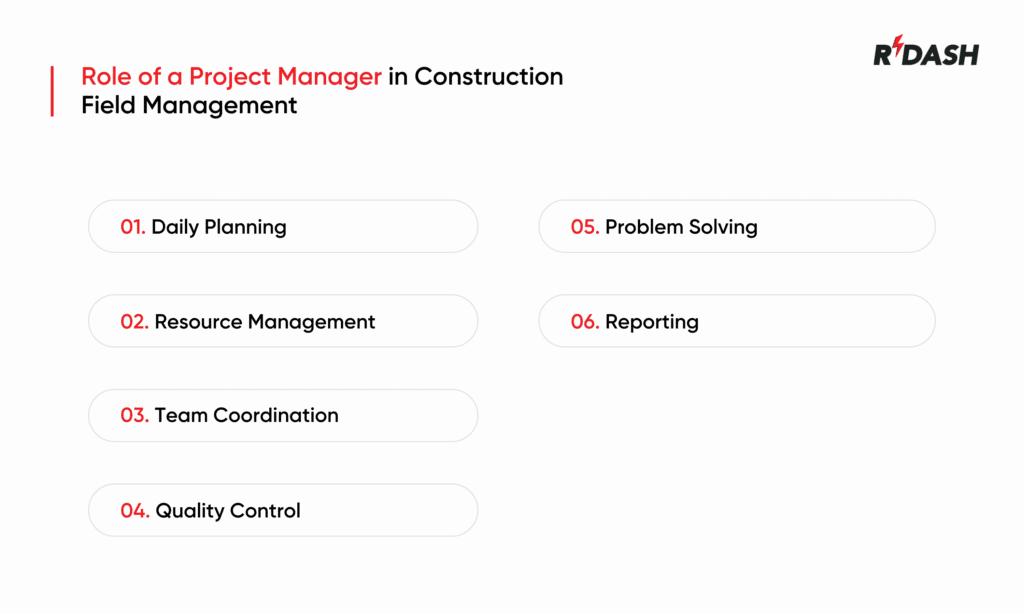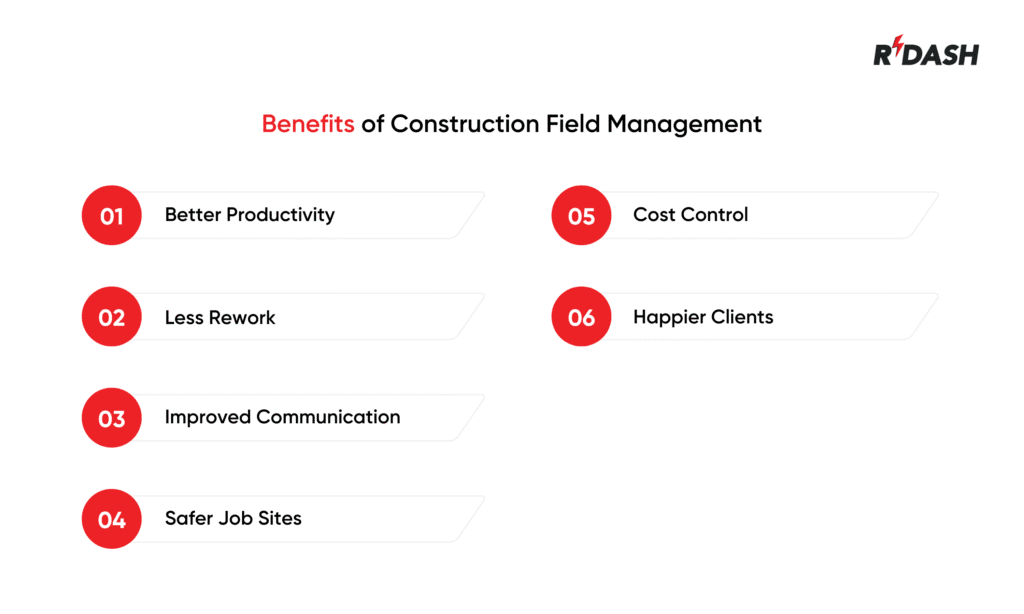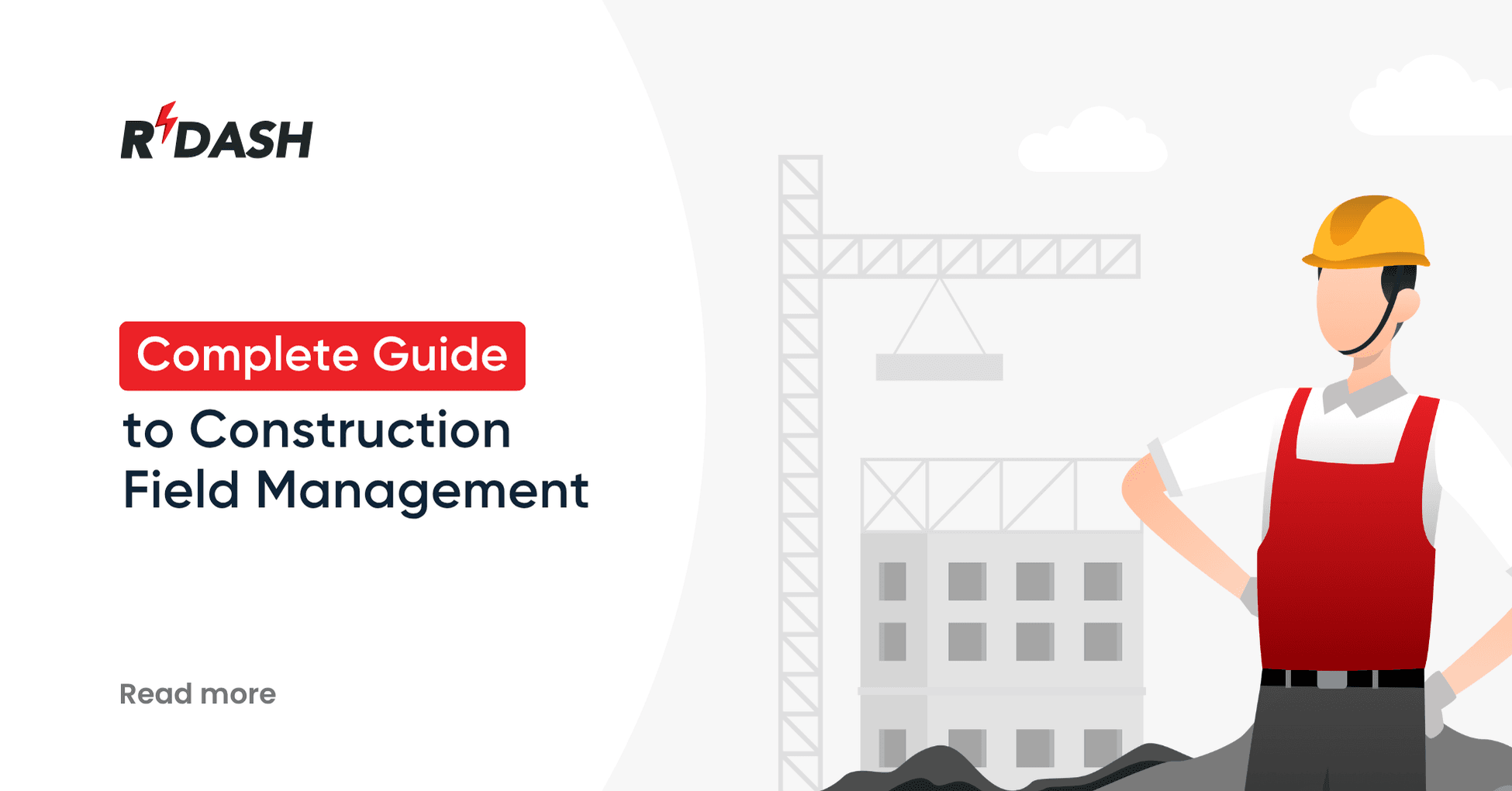What Is Construction Field Management?
Construction field management is all about handling what happens on-site every day. It means keeping track of people, materials, equipment, and tasks to ensure work gets done safely, on time, and within budget. Good field management helps teams stay organized, communicate better, and handle any problems that come up on site.
Unlike office work, field management deals with real-time challenges, like weather delays, equipment breakdowns, or unexpected site conditions. The main goal is to keep the work flowing smoothly, reduce waste, and ensure quality work.
Using digital tools for field management has become popular in recent years. These tools help construction teams track daily activities, share updates, manage documents, and check progress right from the site. This makes it easier to spot problems early and fix them before they become bigger issues.
Role of a Project Manager in Construction Field Management
A project manager plays a key role in construction field management. They act as the main link between what’s planned in the office and what’s happening on the ground. Their job is to make sure that daily site activities match the project’s goals, timeline, and budget.
Here are some ways a project manager supports field management:

Daily Planning:
They plan and coordinate daily tasks, making sure workers know what to do and when.
Resource Management:
They check that the right materials, tools, and equipment are available on site when needed.
Team Coordination:
They stay in touch with workers, subcontractors, and suppliers to make sure everyone knows their tasks and deadlines.
Quality Control:
They monitor work to ensure it meets the required quality and safety standards.
Problem Solving:
When issues arise – like delays or supply shortages – the project manager finds quick solutions to keep work moving.
Reporting:
They track progress and keep owners or clients updated with real-time site reports and photos.
In short, a project manager’s role in field management is to keep things organized and running efficiently. With modern tools and good teamwork, they can handle surprises better, keep costs under control, and deliver projects on time.
How To Improve Your Construction Field Management
Strong construction field management keeps your project running smoothly and helps prevent costly mistakes. Here are some ways to make it better:
Use the Right Tools
Move from paperwork to digital tools. Field management software and mobile apps help record daily progress, share updates, and track tasks in real time.
Plan Ahead
Good field management starts with clear daily and weekly plans. Break tasks into smaller steps and share them with your team so everyone knows what to do each day.
Communicate Clearly
Hold daily briefings with workers and subcontractors. Discuss tasks, safety measures, and site updates. Good communication reduces misunderstandings and keeps everyone aligned.
Keep an Eye on Quality
Regular site inspections and checklists help catch errors early. This helps limit rework and keeps the work quality consistent.
Monitor Resources
Track materials, equipment, and labor daily. This helps prevent material shortages or holdups and makes sure resources are managed properly.
Train Your Team
A well-trained crew works more safely and efficiently. Train workers on how to use equipment safely, follow best practices, and learn any new tools or software.
Stay Flexible
Unexpected issues can happen on any job site. Be ready to adjust schedules and resources when problems come up.
Field Management Challenges
Even with good plans, managing a construction site comes with its own set of challenges:
- Unclear Communication
When information doesn’t flow well between office staff and site teams, mistakes happen. Poor communication can cause rework, delays, or safety risks. - Scattered Documents
Keeping track of drawings, permits, change orders, and daily reports can be difficult if they’re spread across emails or paper files. - Unexpected Delays
Weather, supply chain problems, or labor shortages can slow down work. Without solid planning, these delays can throw off your budget and timeline. - Safety Risks
If safety protocols and real-time monitoring are missing, the chance of accidents on site increases. - Poor Resource Tracking
When materials or equipment are missing or not tracked properly, costs go up and progress slows down. - Low Use of Technology
Many companies still rely on manual updates and phone calls. This can increase errors and make reporting less reliable.
Better planning, clear communication, and the right tools can help solve these challenges and make your site work more efficiently.
Benefits Of Construction Field Management
Good construction field management has a big impact on how smoothly your project runs. Here are some key benefits:

Better Productivity
With clear task lists and daily plans, workers know exactly what to do. This helps get work done faster without confusion.
Less Rework
When work is checked and documented regularly, errors are caught early. This leads to fewer errors and less wasted time or material fixing problems later.
Improved Communication
Field management creates a clear link between the site and the office. Everyone gets updates in real time, which keeps tasks on track.
Safer Job Sites
Daily checks and safety meetings help workers follow safety rules, which reduces the chance of accidents.
Cost Control
Tracking labor, materials, and equipment every day helps avoid waste and keeps spending under control.
Happier Clients
When your project runs smoothly, finishes on time, and stays on budget, clients are more satisfied and more likely to recommend you for future jobs.
FAQs
1. What does construction field management mean?
It’s about planning, tracking, and supervising daily site work to keep projects on time, safe, and within budget.
2. Who handles field management on site?
Usually, a site engineer, field engineer, or project manager oversees field management tasks like daily reporting, safety checks, and progress updates.
3. How can technology help with field management?
Construction Field management software like RDash lets teams track work in real time, share reports instantly, and manage documents easily – all from their phones or tablets.
4. What is the biggest challenge in field management?
Poor communication is a common problem. Without clear updates, mistakes can happen and lead to costly delays.
5. How do you improve field management?
Use digital tools, plan daily tasks well, keep communication clear, do regular inspections, and make sure your crew is trained and updated.






